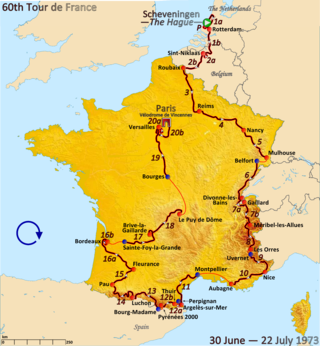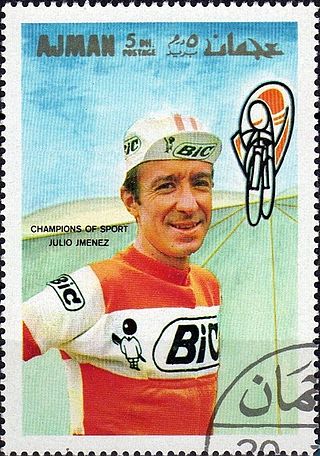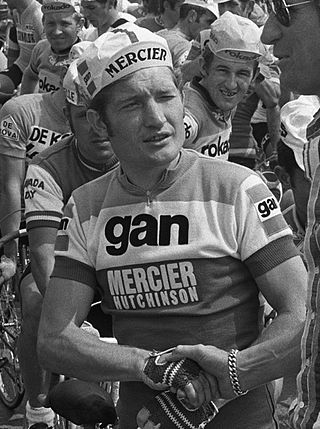The Vuelta a España is an annual multi-stage bicycle race primarily held in Spain, while also occasionally making passes through nearby countries. Inspired by the success of the Tour de France and the Giro d'Italia, the race was first organised in 1935. The race was prevented from being run by the Spanish Civil War and World War II in the early years of its existence; however, the race has been held annually since 1955. As the Vuelta gained prestige and popularity the race was lengthened and its reach began to extend all around the globe. Since 1979, the event has been staged and managed by Unipublic, until in 2014, when the Amaury Sport Organisation acquired control. Since then, they have been working together. The peloton expanded from a primarily Spanish participation to include riders from all over the world. The Vuelta is a UCI World Tour event, which means that the teams that compete in the race are mostly UCI WorldTeams, with the exception of the wild card teams that the organizers can invite.

Federico Martín Bahamontes, born Alejandro Martín Bahamontes, was a Spanish professional road racing cyclist. He won the 1959 Tour de France and a total of 11 Grand Tour stages between 1954 and 1965. He won a total of nine mountain classifications and was the first cyclist to complete a "career triple" by winning the mountain classification in all three Grand Tours. Following his retirement, Bahamontes ran a bicycle and motorcycle shop and was named the best climber in the history of the Tour de France by a panel organised by L'Équipe in 2013.

John James 'Sean' Kelly is an Irish former professional road bicycle racer, one of the most successful road cyclists of the 1980s, and one of the finest Classics riders of all time. From becoming a professional in 1977 until his retirement in 1994, he won 193 professional races, including nine Monument Classics, Paris–Nice a record seven years consecutively and the first UCI Road World Cup in 1989. Kelly won one Grand Tour, the 1988 Vuelta a España, and four green jerseys in the Tour de France. He achieved multiple victories in the Giro di Lombardia, Milan–San Remo, Paris–Roubaix and Liège–Bastogne–Liège, as well as three runners-up placings in the only Monument he failed to win, the Tour of Flanders. Other victories include the Grand Prix des Nations and stage races, the Critérium International, Tour de Suisse, Tour of the Basque Country and Volta a Catalunya.

The mountains classification is a secondary competition in the Tour de France, that started in 1933. It is given to the rider that gains the most points for reaching mountain summits first. The leader of the classification is named the King of the Mountains, and since 1975 wears the polka dot jersey, a white jersey with red polka dots.

The King of the Mountains (KoM) is an award given to the best climbing specialist in a men's cycling road race; in women's cycle racing, Queen of the Mountains (QoM) is used.

Movistar Team is a professional road bicycle racing team which participates at UCI WorldTeam level and has achieved thirteen general classification (GC) victories in Grand Tours. The title sponsor is the Spanish mobile telephone company Telefónica, with the team riding under the name of the company's brand Movistar.

Geox-TMC was a Spanish-based road bicycle racing team, registered for 2011 as a UCI Professional Continental team. Established as Saunier Duval–Prodir in 2004, the team has had success in one-day races such as Clásica de San Sebastián.

The 1974 Tour de France was the 61st edition of the Tour de France, one of cycling's Grand Tours. It took place between 27 June and 21 July, with 22 stages covering a distance of 4,098 km (2,546 mi). Eddy Merckx was attempting to win his fifth Tour de France in as many races.

The 1973 Tour de France was the 60th edition of the Tour de France, one of cycling's Grand Tours. It took place between 30 June and 22 July, with 20 stages covering a distance of 4,090 km (2,541 mi). Eddy Merckx, winner of the previous four editions, did not start the 1973 Tour, partly to avoid angry French fans and partly to please his sponsor; instead he rode and won the 1973 Vuelta a España and the 1973 Giro d'Italia. In his absence, Luis Ocaña dominated the race by winning four mountain stages and two time trials. The result being a margin of victory exceeding 15 minutes.

Éric Caritoux is a French former professional road racing cyclist who raced between 1983 and 1994. He had 22 victories in his career, the highlights of which were winning the Vuelta a España in 1984 and taking the French road race championships in 1988 and 1989. He rode the Tour de France on 11 occasions, his best finish being 12th in 1989.

Julio Jiménez Muñoz was a Spanish professional road racing cyclist.

The 1963 Tour de France was the 50th instance of that Grand Tour. It took place between 23 June and 14 July, with 21 stages covering a distance of 4,138 km (2,571 mi). Stages 2 and 6 were both two part stages, the first half being a regular stage and the second half being a team or individual time trial.
Café de Colombia was a Colombian based professional road bicycle racing Cycling team active from 1983 to 1990. The team was sponsored by the Colombian coffee growers Federación Nacional de Cafeteros de Colombia.
Peugeot team was a French professional cycling team that promoted and rode Peugeot racing bikes.
Skil-Sem was a French professional cycling team which competed during both the 1984 and 1985 seasons. It was the continuation of the Sem-France Loire team. Skil-Sem was the team with which the team's leader, Sean Kelly, dominated the sport in 1984. Another team member, the French rider Éric Caritoux, also won the Vuelta a España in 1984. The team was directed by Jean de Gribaldy.

Mercier was a French professional cycling team that promoted and raced on Mercier racing bikes. Together with the Peugeot team, the Mercier team had a long presence in the cycling sport and in the Tour de France from 1935 until 1984.
The 21st Edition Vuelta a España, a long-distance bicycle stage race and one of the three grand tours, was held from 28 April to 15 May 1966. It consisted of 18 stages covering a total of 2,949.5 km (1,832.7 mi), and was won by Francisco Gabica of the Kas–Kaskol cycling team. Jos van der Vleuten won the points classification and Gregorio San Miguel won the mountains classification.
The 27th Edition Vuelta a España, a long-distance bicycle stage race and one of the three grand tours, was held from 27 April to 14 May 1972. It consisted of 17 stages covering a total of 3,079.3 km (1,913.4 mi), and was won by José Manuel Fuente of the Kas–Kaskol cycling team. Fuente also won the mountains classification while Domingo Perurena won the points classification.
The 29th Edition Vuelta a España, a long-distance bicycle stage race and one of the three grand tours, was held from 23 April to 12 May 1974. It consisted of 19 stages covering a total of 2,987 km (1,856 mi), and was won by José Manuel Fuente of the Kas–Kaskol cycling team. José Luis Albilleira won the mountains classification while Domingo Perurena won the points classification.
Juan José Sagarduy was a Spanish professional cyclist. His last victory as a professional was the Subida a La Reineta in 1967, after physical problems shortened his career. He was forced to retire early in 1969, after being unable to finish his final race at the Vuelta a Levante.













